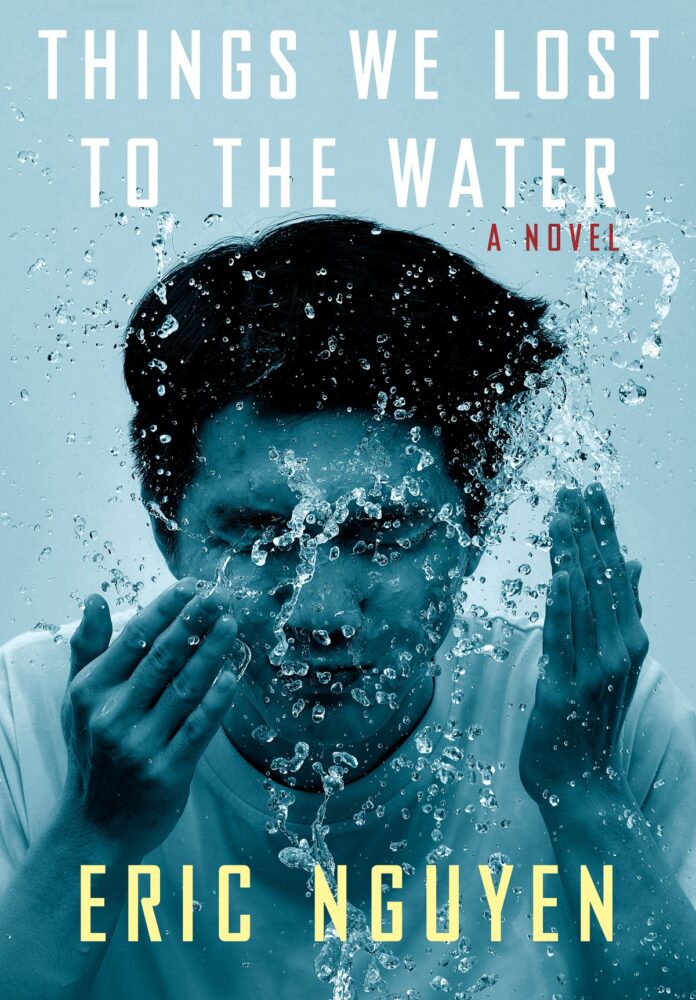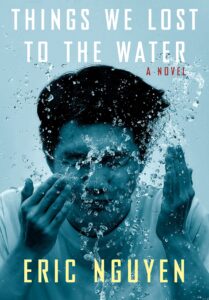Both Water and Country
Things We Lost to the Water by Eric Nguyen
Published: August 31, 2021
Last Updated: December 1, 2021

Knopf, Penguin Random House
Nguyen portrays with sensitivity the economic pressure and social alienation that bears down on a refugee mother who has been separated from her husband and must begin life anew. In a scene where Hương is searching for work, she clumsily grasps for the correct words in English but to no avail: “The last thing she saw on the girl’s face was a grimace. She was being told, she was sure, that she had done something rude, against the country’s law. They would arrest her. They would arrest a woman and her children for not knowing the rules.” Fearing that she will be driven out of yet another country for some arbitrary reason, Hương’s anxiety conveys an enduring refugee consciousness, or what historian Khatharya Um terms “refugitude.” At the same time, this encounter subtly represents a wider contemporary critique of the Trump-era immigration regime, in which many immigrants and noncitizens are arrested and deported for their failure to comprehend the tangle of US laws.
Nguyen’s novel spans nearly three decades and rotates among the perspectives of Hương and her sons, Tuấn and Ben. In this twist on the Asian American bildungsroman, the mother is not a fixed character. She also ages and makes her own mistakes alongside her children. In her attempt to insulate her boys from the poverty of Versailles, Hương unintentionally drives Tuấn to find a new family in a Vietnamese gang. And in response to her attempt to conceal the history of their father, Ben leaves for Paris in order to follow his father’s footsteps by studying French literature. Still aching from the loss of her husband, she feels this ache “[growing] into two boys, and the two boys grow into two sons, and those two sons grow to look like their father, uncannily like their father in their moods, their movements, their voices, so that it’s always like she’s losing him again—to the world, to life, to fate.” In her overwhelming loss, Hương turns inwards toward her sons; but in doing so, drives them away from her and thus faces loss again and anew. This ache of loss is depicted as something alive, morphing but never disappearing.
The family endures the loss of not just a father and husband, but of their country as well. Even Ben, who had never known Vietnam, nevertheless feels the shape of its absence in his life. This loss of home is repeated in the wake of Hurricane Katrina. The water that carried Hương to refugee camps in Southeast Asia had also threatened to drown her; and the water that sustained the communities of Louisiana now threatens to do the same. The mercurial nature of water is a lesson in precarity that the refugee is all too familiar with. One may spend years building a home only to have it swept away in a moment (“nước,” as Vietnamese speakers know, means both “water” and “country”).
The novel’s language is at its most lyric when, in its final pages, Katrina finally arrives. In one passage, the hurricane is likened to an industrious but indignant housewife: “The city is like a bathtub. The winds are the hands of a housewife. The water a mixture of tap and cleaning detergent. The housewife scrubs and scrubs. She is sure not to miss a spot. She wants to make sure no one forgets her name when she is gone and how good a housewife she was. She is bitter.” The devastation of Hurricane Katrina not only repeats but reopens their earlier losses. Hương thus halts in mourning the loss of her home in New Orleans when she realizes that she has still not finished mourning the loss of her first home, her dead, and her youth.
Things We Lost to the Water gorgeously illustrates how things can come together for a moment only to fall apart again. As Nguyen stated in an interview for the Chicago Review of Books, “It’s that haunting of never finding a home or not being able to settle that’s haunting my novel: that thought that you have to leave soon. It’s really ingrained in the refugee consciousness, I think, that you can get kicked out at any moment.” Fittingly, then, this novel is one without a proper ending, because loss does not work that way. But we learn that even if the task of mourning can never be finished, we somehow still get up and continue living.
Sydney To is a PhD candidate in the English Department at UC Berkeley, with research interests in Asian American literature and critical refugee studies. His writing has appeared in diaCRITICS, Asymptote, the Chicago Review of Books, and other publications.
